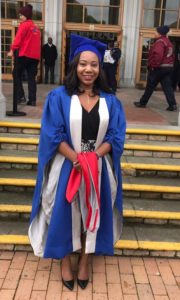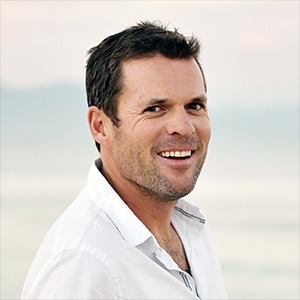“African women need to be economically empowered!”
| Dr. Fatuma Mninde-Silungwe is a lawyer from Malawi and Alumna from the South African German Center for Transnational Criminal Justice. The interview took place during the 2nd DAAD Centers for African Excellence Alumni Conference in Akosombo, Ghana, where Fatuma held a presentation which was titled: Contributing to the Achievement of the SDG 16 on Peace, Justice and strong Institutions through Training in Transnational Criminal Justice and Crime Prevention in Africa.
She has done research in International Criminal Law and in Electoral Law. Her fields of interest include International Criminal Law, Criminal Justice, Elections, Human Rights and Good Governance. She currently works as a Legal Analyst on Elections with the United Nations Development Program in Malawi. |

Interview
May you introduce yourself to the readers?
Dr. Silungwe: My name is Dr. Fatuma Silungwe. I am an Alumna of the South African – German Center for Transnational Criminal Justice.
What did you study?
Dr. Silungwe: I studied law at the University of Malawi. In my Masters level, I studied for an LL.M. and Transnational Criminal Justice and Crime Prevention which I completed in 2013 with a cum laude. During my LL.M studies, I specialized in Anti Money Laundering, Anti-corruption, International Criminal Law and Transitional Justice. Then I proceeded to do my PhD in International Criminal Law. My PhD research was on Regionalization of International Criminal Justice in Africa and I graduated on 27 August 2018.
Have you studied abroad?
Dr. Silungwe: My first time to study abroad was for my Masters when I went to do my Masters in South Africa after I got a DAAD scholarship. When I was doing my PhD I also stayed in Berlin for some time and in Cape Town for some time. Those were the two experiences that I have stayed and studied abroad for a longer period of time. In another case it was just for a short period of time when I came to Ghana once for a certificate course in legislative drafting.
How did the DAAD grab your attention?
Dr. Silungwe: A friend of mine got a DAAD scholarship some years before I went to do my Masters. She forwarded to me a Call for Applications for a DAAD scholarship to study an LL.M in Transnational Criminal Justice and Crime Prevention. Before that, I did not know about that kind of scholarship but when she forwarded it to me I applied and was fortunate enough to be considered.
What kind of influence did the scholarship have on your career?
Dr. Silungwe: I would say my career has progressed, because when I joined the program, to do my Masters, I was working for the Government of Malawi as a State Advocate. After my Masters I was able to get the job where I work now with the United Nations Development Program as a Legal Analyst. The Minimum qualification was a Master of Law Degree so – obviously – If I did not have it, then I would not gotten that job. So yes, the scholarship has influenced my career progression. I also think with the qualifications I have acquired, I believe that I will be able to get other opportunities, whether within the same institution or in other institutions.
Do you have children?
Dr. Silungwe: I don’t have children.
Do you think the DAAD scholarship can help women to combine career and family?
Dr. Silungwe: I think it does. I’ve seen others who have benefitted from DAAD scholarships getting a stipend for their children and even for their husband when they are studying abroad. So, it helps the family to be together, especially when such kind of funding is provided to cater for family members.
Apart from the family, what does a scholarship mean for women?
Dr. Silungwe: One key issue in terms of us African women is that we need to be economically empowered! And with more education comes more opportunities remunerable employment. I am economically empowered because I am educated. That’s important for a woman. Apart from economic empowerment, advancement in education enables women to contribute and influence policy from an informed point of view. Such policies include policies that encourage inclusion of women in different areas of the economy and governance of different African countries.
Regarding the empowerment of African women, I think, we can do more. So what do you think can the DAAD improve when it comes to the empowerment of women?
Dr. Silungwe: I think DAAD can do more in terms of opening up opportunities for qualified women enable them access education, because most of such women are not able to get funding to go and study abroad or even within their countries. As such by providing scholarship opportunities for them, women will be able to access education which is really important. In addition, in terms of research within the DAAD Centers of Excellence, the research could focus on how gender can be mainstreamed in all the courses that the Centers cover, because I believe gender is an overarching issue whether we are studying International Criminal Law, Transitional Justice or other courses. So DAAD should support the Centers to ensure that they are including gender in their course work.
We are now talking about Africa respectively Sub-Saharan Africa and I’m wondering, because not every country has the same development issues. So to what extent can we talk about Africa in general?
Dr. Silungwe: It’s important to note that Africa is a continent of 54 countries and each country has its own social-economic development issues. It’s not good to generalize and to say: Africa is this and that. You need to go the individual countries and regions and assess what kind of needs those countries have. As such, when designing any program at a country-level, it should be a program that will fit the needs of that particular country, not just putting Africa on one platter.
In the European perception Africa is still often considered as “one country”.
Dr. Silungwe: Well, there is the European Union with different countries and we have the African Union with 54 countries. It’s important that people are aware of that.
Thank you very much, Dr. Silungwe.
The Interview was held by Lani Marie Doehring, a Student Assistant at GGCDS (Ghanaian-German Center for Development Studies) at the Center for Development Research Bonn, Germany.
You must be logged in to rate posts.



